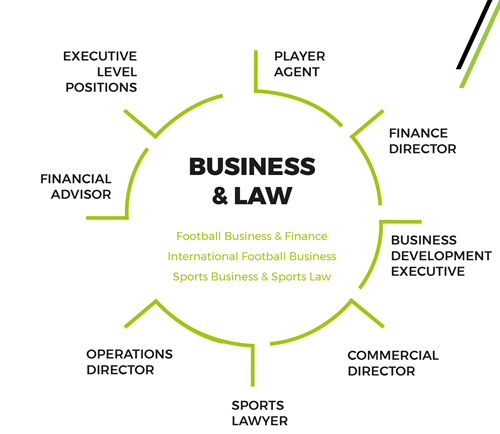Looking to start this September? It’s not too late to score your dream career – Apply through Clearing today and begin your studies at UCFB!
Degree overview
Sport is regulated by a complex pattern of law and regulation. Sport executives not only need to conform to the regulations established by the authorities, but they must also use their understanding of the legal framework to ensure compliance with the law of the land, and protect the business from risk.
This degree links the commercial and legal aspects of sports business, through varied learning such as field trips to the likes of the Supreme Court and workshop masterclasses with sports law specialists.

Degree content
Modules will focus on sport business, domestic and EU sport law, the role of governing bodies in sport and international sport business governance.
You will also explore the legal challenges regarding the use of social media within the industry, recent case studies regarding drug abuse and racism in sport and the legal issues surrounding safety in sport stadiums and of spectators.
The broad spectrum of subjects covered, including player contracts at home and abroad, loan agreements, transfer negotiations, disciplinary and regulatory problems, intellectual property rights, product endorsement and sponsorship deals, will help you apply theory to live projects to develop your employability skills and provide you with a balanced undergraduate degree.
Teaching locations for this degree include:
In addition to our teaching locations, we also use specialist facilities throughout the academic year as well as additional facilities where required.

UCFB gave us the platform to work while studying, and it gave us the opportunity to work on projects that we liked. It gave us the chance to grow organically.
Modules
- Legal Systems and Principles
- Understanding Sports Business
- Industry Competencies (Mental Wealth)
- Sports Law: Theory and Practice
- Introduction to Sport Finance
- Understanding International Football Business Environment
- Sports, Crime and Deviance
- Managing Sports Organisations
- Industry Readiness (Mental Wealth)
- Research Methods
- Legal Issues in the Governance of Sport
- Entrepreneurship
- Employment Law and Sport
- Strategic Management
- Industry Engagement (Mental Wealth)
- Professional Project
- Commercial Sports Law

University Campus of Football Business is an embedded college of the University of East London. All graduates will receive a degree from the University of East London.
Click here to download the course specification
- QAA Subject Benchmark Statement for Business and Management (2019)
- QAA Subject Benchmark Statement for Events, Hospitality, Leisure, Sport and Tourism (2019)
- QAA Subject Benchmark Statement for Law (2019)
Visit the QAA website to access each of these benchmark statements.
Entry requirements
- UCFB Wembley course code: SBL1
- Institution: U10
- Campus: W
- UCFB Manchester Campus course code: SBL1
- Institution: U10
- Campus: E
- 112 UCAS tariff points or equivalent non-tariff qualifications
- GCSE Maths and English Language (Grade C/4 or above) or equivalent e.g. Functional Skills Level 2
- International applicants will be asked to pass the Academic IELTS test with a minimum overall score of 6.0 and no less than 5.5 in each of the four elements
All applications are reviewed on a case by case basis. If your academic achievements do not meet the minimum level required but you have considerable professional experience, please contact admissions@ucfb.com.
Please be aware that all applicants who do not hold British or Irish nationality will require a visa to study in the UK.
Our access to a UK Government Student Visa licence is currently being reviewed. This means we are unable to consider applications from any applicant who would require a student visa to study in the UK as we cannot issue a Confirmation of Acceptance for Studies (CAS).
If you are unsure whether you would need a visa to study in the UK, or for more information, please contact compliance@ucfb.com.
If you don’t hold a visa for the UK and would still like to study with UCFB, please consider Football Coaching (Distance with Attendance).
We accept applications with advanced standing via our Advanced Prior Learning (APL) application process. Should you wish to apply for direct entry into Year 2 or Year 3 of one of our undergraduate degree programmes, you will be required to complete an APL application form and provide us with evidence of your previous studies.
Please contact admissions@ucfb.com for further detailed guidance. Please note that should you wish to apply via this process, we strongly encourage you to begin the application process early in the cycle and you will still be required to complete a UCAS application.
All applications for an undergraduate degree programme are submitted via UCAS. To apply, please visit UCAS.com.
Career prospects
Career prospects for graduates of the BA (Hons) Sports Business & Sports Law degree programme at UCFB include not only qualifying as a lawyer through further study but governance roles, paralegal work within sport organisations and sport management roles for teams, clubs and athletes.

Over 90% of UCFB graduates are in employment within six months of graduating and almost two-thirds of them work within the global sports industry.
At UCFB we bridge the gap between education and business, allowing a unique approach to education. We provide two curricula; the academic curriculum which encompasses exams and coursework and the Employability & Career Planning programme – a three year journey of professional and personal development.
This provides access to best-in-class industry guest speakers, additional qualifications and exceptional opportunities to apply for work experience placements to ensure our students graduate as well-rounded, empowered professionals.
Find out more about your career journey at UCFB

Each of our UCFB undergraduate degrees is underpinned by an embedded strand of learning and skills development, including a formalised a short work-placement opportunity, to better equip students for the 21st century workplace and enhance employability opportunities.
This allows students to develop a set of key transferrable skills to ensure they are ready for the modern workplace when they graduate, including emotional, social, physical, cultural and cognitive intelligence, digital proficiency, industry and community connections, and giving back to the community through projects and volunteering.
Every UCFB degree has one Mental Wealth module in each academic year to cover these skills, and our learning outcomes for all modules are closely mapped to these same competencies in order to maximise graduate's industry readiness and career opportunities.

The UCFB Academy, Wembley team at UCFB Wembley had a hugely successful season, winning the BUCS League South Eastern Tier 2A in an unbeaten season. Among their ranks is Evie Gane, a BA (Hons) Sports Business & Sports Law student who backed up her team’s success with the individual achievement of earning a trial and then signing for WSL Championship side London Bees.
Read more
UCFB is lucky enough to count not one, not two, but three graduates who are employed at recently promoted, Championship newcomers Wycombe Wanderers. Here, Josh Easterbrook, who works as a Commercial & Legal Executive at the club, tells us about his role.
Read more
Fees
Visit our dedicated page about fees and student finance.
The provision of a facility or service including accommodation may be subject to an additional charge (i.e. separate from tuition fees). Where this is the case, we will make this clear in advance and payment for such service shall be made in accordance with any additional contract made between you and the University.
In some instances, optional activities provided by UCFB may carry an additional cost for participants (e.g. qualifications with external certification such as FA Coaching Badges). Any additional costs will be provided to students in advance of any such sessions running.
UCFB has a range of scholarship and bursary options to help with the cost of studying and to encourage students to embrace their time at UCFB and graduate with more than just their university degree. Click here to learn more.


UCFB provides an exceptional environment to live and learn in, with state-of-the-art facilities in two inspirational campuses in London and Manchester.
Find out more
















